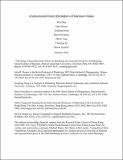Unstructured Direct Elicitation of Decision Rules
Author(s)
Ding, Min; Hauser, John R.; Dong, Songting; Dzyabura, Daria; Yang, Zhilin; Su, Chenting; Gaskin, Steven; ... Show more Show less
DownloadHauser_Unstructured Direct.pdf (255.3Kb)
OPEN_ACCESS_POLICY
Open Access Policy
Creative Commons Attribution-Noncommercial-Share Alike
Terms of use
Metadata
Show full item recordAbstract
We investigate the feasibility of unstructured direct-elicitation (UDE) of decision rules consumers use to form consideration sets. With incentives to think hard and answer truthfully, tested formats ask respondents to state non-compensatory, compensatory, or mixed rules for agents who will select a product for the respondents. In a mobile-phone study two validation tasks (one delayed 3 weeks) ask respondents to indicate which of 32 mobile phones they would consider from a fractional 4[superscript 5]x2[superscript 2] design of features and levels. UDE predicts consideration sets better, across profiles and across respondents, than a structured direct-elicitation method (SDE). It predicts comparably to established incentive-aligned compensatory, non-compensatory, and mixed decompositional methods. In a more-complex (20x7x5[superscript 2]x4x3[superscript 4]x2[superscript 2]) automobile study, non-compensatory decomposition is not feasible and additive-utility decomposition is strained, but UDE scales well. Incentives are aligned for all methods using prize indemnity insurance to award a chance at $40,000 for an automobile plus cash. UDE predicts consideration sets better than either additive decomposition or an established SDE method (Casemap). We discuss the strengths and weaknesses of UDE relative to established methods.
Date issued
2011-02Department
Sloan School of ManagementJournal
Journal of Marketing Research
Publisher
American Marketing Association
Citation
Ding, Min, John R. Hauser, Songting Dong, Daria Dzyabura, Zhilin Yang, Chenting Su, and Steven P. Gaskin. "Unstructured Direct Elicitation of Decision Rules." Journal of Marketing Research (2011) 48(1): p. 116-127.
Version: Author's final manuscript
ISSN
0022-2437
1547-7193